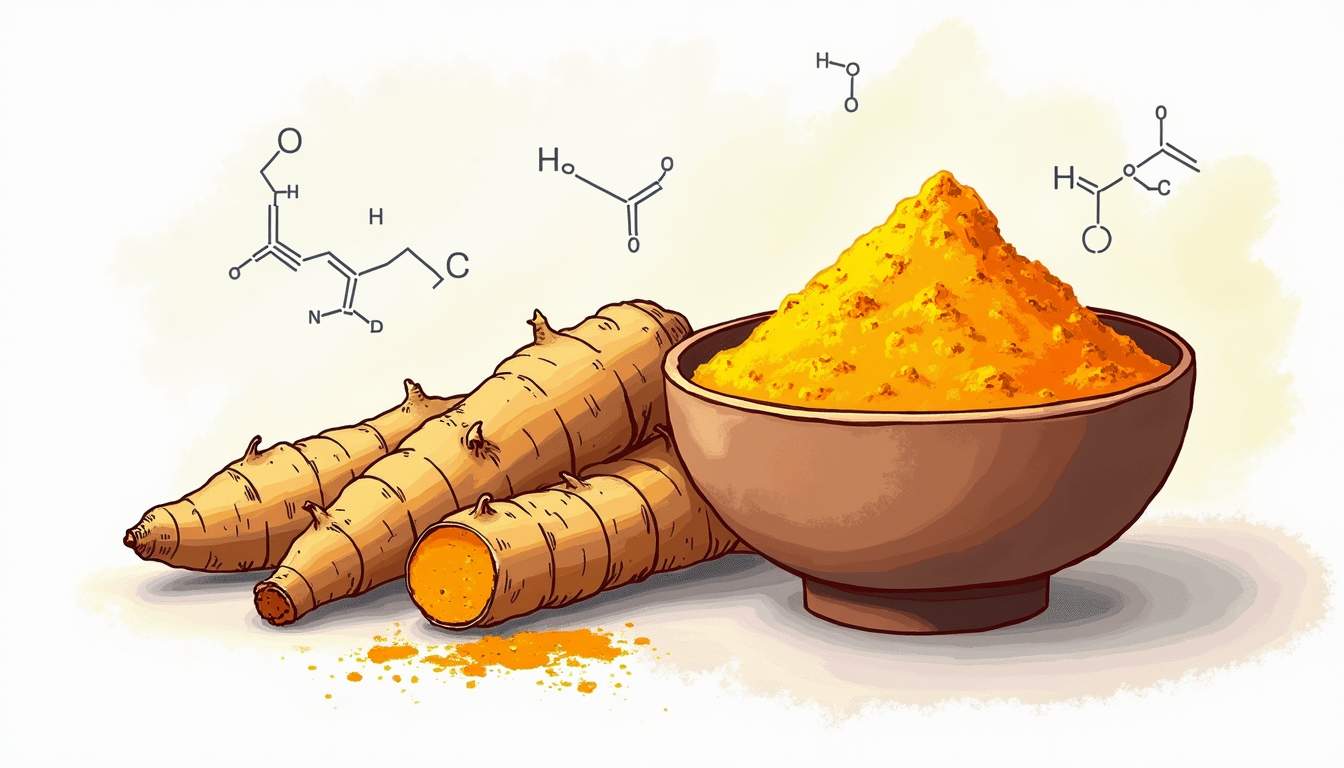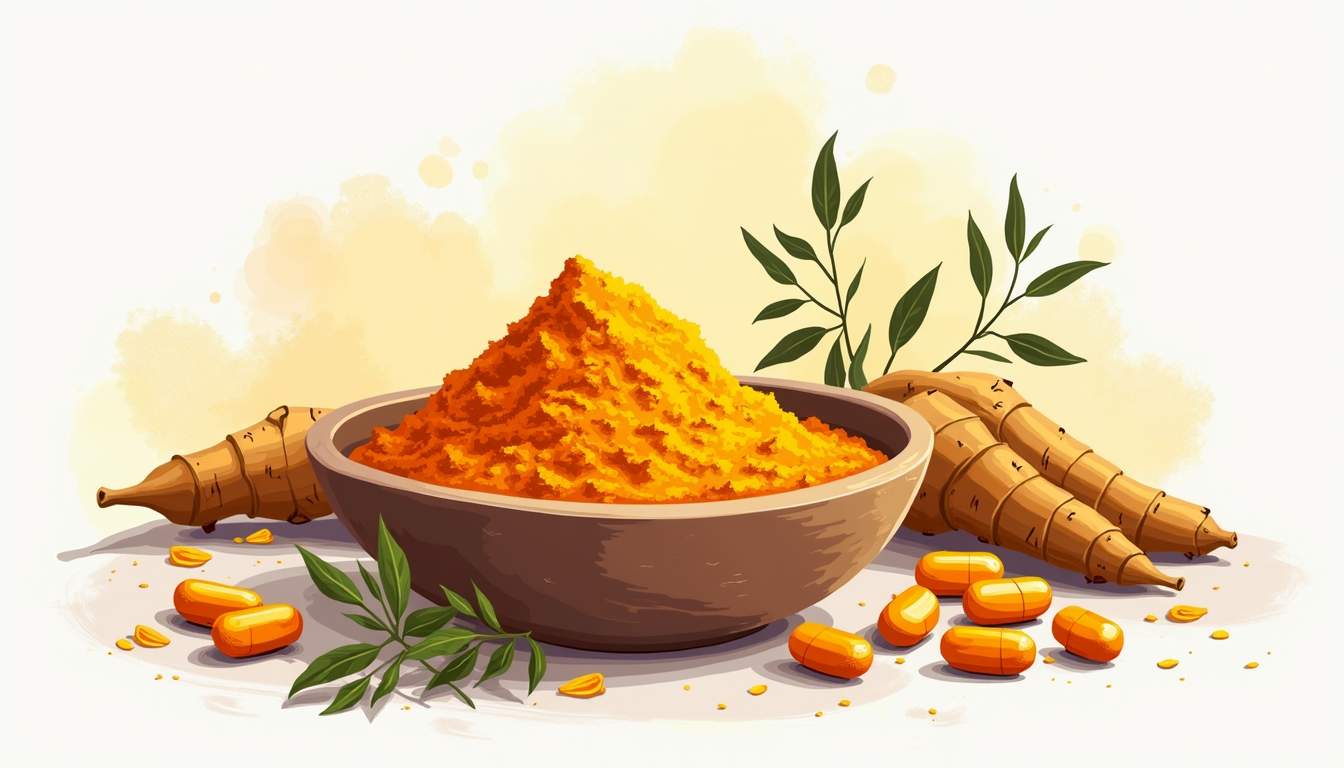Turmeric powder, rich in the active compound curcumin, offers powerful anti-inflammatory and antioxidant benefits. When used as a supplement, especially with black pepper to enhance absorption, turmeric may support joint, brain, and heart health.
The Science Behind Turmeric
Turmeric is not just a culinary spice; it is a powerhouse of bioactive compounds that contribute to its medicinal properties. The primary active ingredient, curcumin, is responsible for many of the health benefits associated with turmeric. Curcumin is known for its anti-inflammatory and antioxidant effects, which have been the focus of extensive research in recent years.

Understanding Curcumin: The Active Compound
Curcumin is a polyphenol that exhibits a wide range of biological activities. Its molecular structure allows it to interact with various cellular pathways, making it a subject of interest in the fields of biochemistry and pharmacology. Research indicates that curcumin can modulate inflammatory processes, potentially reducing the risk of chronic diseases.
Moreover, curcumin's bioavailability is a crucial factor in its effectiveness. It is poorly absorbed in the bloodstream when consumed alone, which has led to the development of various formulations aimed at enhancing its absorption. Combining curcumin with black pepper, which contains piperine, has been shown to significantly increase its bioavailability, making it more effective as a supplement.
Historical Use in Traditional Medicine
The use of turmeric in traditional medicine dates back thousands of years, particularly in Ayurvedic and Traditional Chinese Medicine. In these practices, turmeric has been employed to treat a variety of ailments, including digestive disorders, skin conditions, and inflammatory diseases. The historical context of turmeric's use underscores its long-standing reputation as a healing agent.
In Ayurvedic medicine, turmeric is often referred to as "golden spice" due to its color and therapeutic properties. It has been used not only for its health benefits but also as a natural dye and preservative. This rich history provides a foundation for understanding the modern interest in turmeric as a dietary supplement. Interestingly, turmeric's use has transcended cultures; in Southeast Asia, it is often incorporated into rituals and celebrations, symbolizing prosperity and health.
Health Benefits of Turmeric Supplements
As research continues to unveil the potential health benefits of turmeric, many individuals are turning to turmeric supplements to enhance their wellness routines. From reducing inflammation to supporting brain health, the advantages of incorporating turmeric into one’s diet are numerous.

Anti-inflammatory and Antioxidant Properties
One of the most well-documented benefits of turmeric is its anti-inflammatory properties. Chronic inflammation is linked to numerous health issues, including heart disease, diabetes, and cancer. Curcumin has been shown to inhibit several molecules that play a role in inflammation, making it a powerful ally in managing inflammatory conditions.
In addition to its anti-inflammatory effects, curcumin is also a potent antioxidant. Antioxidants are essential for neutralizing free radicals in the body, which can cause oxidative stress and damage cells. By combating oxidative stress, turmeric may help in reducing the risk of chronic diseases and promoting overall health. Some studies have even suggested that curcumin may enhance the body's own antioxidant enzymes, creating a synergistic effect that further bolsters cellular defense mechanisms.
Potential Effects on Brain Function and Disease Prevention
Emerging studies suggest that curcumin may also have neuroprotective properties, potentially benefiting brain health. Research indicates that curcumin can increase levels of brain-derived neurotrophic factor (BDNF), a protein linked to improved cognitive function and a lower risk of neurodegenerative diseases such as Alzheimer’s.
Furthermore, the anti-inflammatory and antioxidant effects of curcumin may contribute to its potential role in disease prevention. Some studies have shown that regular consumption of turmeric may lower the risk of developing conditions such as heart disease and certain cancers. While more research is needed to establish definitive conclusions, the preliminary findings are promising. Additionally, curcumin's ability to cross the blood-brain barrier is particularly noteworthy, as it allows for direct effects on brain tissue, potentially enhancing cognitive resilience as we age.
Practical Guide to Turmeric Supplementation
For those interested in reaping the benefits of turmeric, understanding how to properly incorporate it into a daily routine is essential. This section provides practical advice on dosage, forms, and product selection to ensure maximum effectiveness.
Dosage Recommendations and Bioavailability
Determining the appropriate dosage of turmeric supplements can vary based on individual health needs and the specific formulation of the product. Generally, studies have used doses ranging from 500 mg to 2000 mg of curcumin per day, often divided into two or three doses. However, it is crucial to consult with a healthcare professional before starting any new supplement regimen.
As mentioned earlier, the bioavailability of curcumin is a significant consideration. To enhance absorption, many supplements include piperine or other compounds that aid in its uptake. Additionally, consuming turmeric with fats, such as coconut oil or olive oil, can further improve its bioavailability, making it more effective in the body. The synergy between curcumin and these fats not only enhances absorption but also allows for a more sustained release of curcumin into the bloodstream, maximizing its therapeutic potential.
Different Forms and How to Choose Quality Products
Turmeric supplements are available in various forms, including capsules, powders, and liquid extracts. Each form has its advantages and may suit different preferences. Capsules are convenient for on-the-go supplementation, while powders can be easily added to smoothies, soups, or teas.
When selecting a turmeric supplement, it is essential to choose high-quality products from reputable brands. Look for supplements that contain standardized curcumin extracts, as these ensure a consistent level of active ingredients. Additionally, checking for third-party testing can provide assurance of the product's purity and potency. Some brands also offer turmeric blends that combine curcumin with other beneficial herbs and spices, such as ginger or cinnamon, which may enhance the overall health benefits and provide a more holistic approach to wellness.
For a high-quality supplement that combines turmeric with black pepper for maximum absorption, explore our Turmeric + Curcuma capsules here.

Share:
Turmeric, Ginger, and Black Pepper: The Ultimate Trio for Anti-Inflammatory and Digestive Health
Ginger and Turmeric Supplements: Health Benefits, Dosage, and How to Use Them